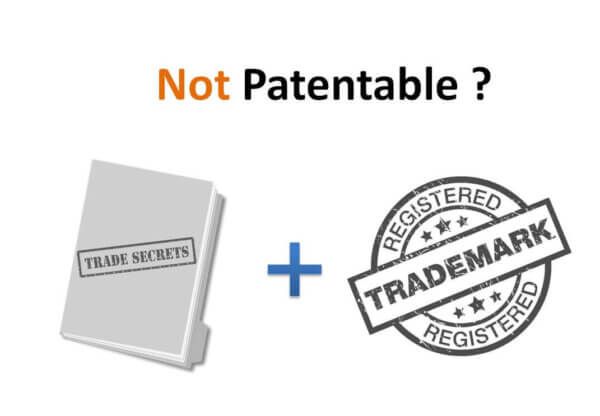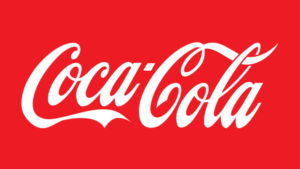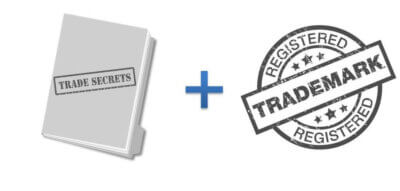Patent protection versus Trade secret and trademark in US
Patent versus Trade secret: Patents and trade secrets are two forms of intellectual property protection. Patents provide exclusive rights to an invention for a limited time in exchange for disclosure, while trade secrets protect confidential information that provides a competitive advantage. The choice depends on factors like disclosure, enforceability, and long-term secrecy needs.
Table of Contents

Not patentable? here is another way for protection
What if your invention or innovative idea is found to be non-patentable? how do you protect it then ? There is another way : “trade secrets”
A trade secret is a formula, practice, process, design, instrument, pattern, commercial method, or compilation of information not generally known or reasonably ascertainable by others by which a business can obtain an economic advantage over competitors or customers.
- It is secret
- It confers a competitive advantage on its owner
- It is subject to reasonable efforts to maintain its secrecy
however, this is not necessarily for inventions that are non-patentable but even invention that are falling under category of patentable inventions can also be protected as trade secrets.

- The first thing is the information should be secret, that is it should not be readily available to competitors or is generally known by the public. in our example of Coca Cola if one of the competitor beverages manufacturing companies figure out the formula for Coca Cola then it would lose its secret status although it is not available to the public at large.
- The second important thing is the information should have some competitive advantage how economic advantage to the corner of the trade secret. and
- The third point is the owner of a trade secret should take reasonable efforts to keep the information secret and not disclose it in the public domain
Trade secrets for a business can range from specific formula or manufacturing process to a list of clients. unlike patents you don’t need to disclose the entire innovative idea to get the trade secret.
Advantages of using trade secret
So if you are thinking about protecting your invention or innovative ideas with trade secrets following are the advantages of using trade secrets:
- The biggest advantage is it doesn’t require any registration cost
- and unlike patent they are not Limited for 20 years of time that is the protection is valid as long as the secret is not reveal to the public
- trade secret does not require any formalities or disclosure of innovative ideas to government authorities
- and like patents trade secret does not require waiting period like for grant of patent.
- And trade secret costs must less when compared to Cost of filing patent in US
- Trade secrets do not require public disclosure and aren’t subject to the same formal application process or expense.
In general, the cost of maintaining confidentiality and protecting trade secrets is internal costs of administration and installing appropriate procedures in the business. I am sure you would be impressed by the simplicity and ease of protection provided by trade secrets, Particularly the idea that you don’t need to disclose your business secret or innovative idea to anyone else, and no formalities are required;
What can go wrong with trade secrets ?
the question is, you don’t disclose your business secret or innovative idea to anyone else, and no formalities are required, you have complete control over your business secret. then what can go wrong ??
To understand this let’s take an exemplary scenario: Let’s say you have come up with an inventive product A. which is found to be patentable and you are considering whether you should protect it by means of patents or by means of trade secrets…
if you choose to go for trade secret and reject the options for getting a patent, there are few things that could go wrong:
When you produce your inventive product A, and commercially sell in the market, and it is really successful, the probability is competitors would be watching it and they will analyze and reverse engineer your product A and will figure out your invention (that is your trade secret in this case) and when this happens unlike patents; trade secret does not give your right to exclude others from commercially utilizing your invention,
So in a way, the protection provided by trade secret in terms of excluding competition from using your innovative idea is weaker than patent. The only protection for trade secrets is on the grounds of misappropriation of trade secrets.
The very simplicity and informal nature of the protection that we are impressed by earlier is in fact becomes a difficulty when we try to enforce trade secrets by misappropriation:
- in this case, you have to prove that the person who has acquired the trade secrets from you is by an improper way
- Generally, this becomes a weak case, and since there are no formal documentation available or government parties involved like in the case of patents,
- in most cases, it is difficult to prove with ambiguous claims.
- And if we cannot prove that then the other person can legally use our trade secret
And that is why the patent is such a big winner !!! and most favorite means of protection of inventions and innovative ideas for entrepreneurs and business owners. Although trade secret seems easier to protect your innovative ideas in reality it is difficult and costly to protect your business secret and it is even difficult to enforce when compared with patent. and if you have an option to select that is if the innovative idea in consideration is eligible to get a patent for it you should consider patenting it in most of the cases.
Having said these even trade secrets are potent forms of protection for your innovative ideas and business Secrets.
Combining trademark and trade secret protection in US

So if you combine trade secret protection with trademark protection of your innovative ideas, in certain cases it becomes comparable protection with patents !!! In a famous example of “Coca-Cola” the brand is protected by trademark and the secret ingredients, recipe, and process to create the famous beverage is a well-kept secret for decades, that is achieved by trade secrets !!!
and if you have observed the evaluation of the intellectual property (trademarks and trade secrets ) of companies like coca-cola is way greater than the physical assets of the company (like machineries, factories etc…)
“So, trademark and trade secret protections combined together may provide a very strong protection for your intellectual property.”
In a recent case with best buy, they have finalized for 27 million dollars in one of the case for misappropriation of trade secret from a small startup company. the link is provided below
http://www.startribune.com/best-buy-to-pay-27-million-in-trade-secrets-case/182365221/
Now let’s see some of the examples of what information in your business can be trade secret:
- Any information that is created by our business in order to perform its functions Efficiently
- The process and methods used in business operation
- List of clients, original equipment manufacturers, suppliers
- pricing strategy and profit margins
- growth strategies Business plans or business development strategies
- wisdom gain by business from field experiments
- know-how about some important functions
- research and development conducted
- Technical details and specifications of the product
- software or hardware involved in certain processes
- chemical composition and formula etc…
sometimes identifying the trade secret is not that obvious and you need to drill down by asking you questions about your business like,
“What is the most important information in my business if it is found out by others I will lose the competitive advantage of my business ?”
Where are the steps for protecting your business Secret by means of a trade secret:
Find out what really is important information for your business needs to be kept secret And create a document mentioning the trade secrets for the business.
Keeping It Confidential: You need to take appropriate care for maintaining the confidentiality of this information for example: if your secret is on the computer the access should be limited to only authorized users, and information should not be available publicly. and if the trade secret is in the physical document format. should be kept in a safe area and location where unauthorized access is restricted.

Non-disclosure and non compete agreement:
As a part of general practice to maintain the confidentiality of the important information of the business, all the employees of your business should be signing non-disclosure and non-compete agreements.
perform regular audits about the confidentiality of ongoing business information and make employees aware of maintaining the secrecy of the information from time to time.
“Misappropriation” of Trade Secrets in US
Section 1(2) of the UTSA provides the following definition for the term:
“Misappropriation ” means:
- acquisition of a trade secret of another by a person who knows or has reason to know that the trade secret was acquired by improper means; or
- disclosure or use of a trade secret of another without express or implied consent by a person who
- used improper means to acquire knowledge of the trade secret; or
- at the time of disclosure or use knew or had reason to know that his knowledge of the trade secret was
- derived from or through a person who has utilized improper means to acquire it;
- acquired under circumstances giving rise to a duty to maintain its secrecy or limit its use; or
- derived from or through a person who owed a duty to the person seeking relief to maintain its secrecy or limit its use; or
- before a material change of his position, knew or had reason to know that it was a trade secret ad that knowledge of it had been acquired by accident or mistake.
If you obtain trade Secret by improper means which includes theft, fraud, bribery, breaching a contractual duty to keep something confidential, or inducing others to breach that duty.
An example of a situation would be if one of your employees taking confidential information from your business to his home which is violating the confidentiality agreement or if an employee makes illegal copies of confidential information from your computer.
If you make the trade secret public which was required by another person that you know is by improper means or if one of your employees has done a confidentiality agreement with a previous company and he is disclosing the secret information to you knowing that he already has signed the non-disclosure agreement would also breach the agreement.
Having said this, If one of your competitors reverse engineers your product or services and figure out on his own the trade secret information then this does not come under improper means of obtaining information. Hence this cannot be claimed as misappropriation !!! and this is probably the biggest loophole or disadvantage of trade secrets when we compare it with patents. You cannot protect your business against the legal discovery of your trade Secrets by your competitors. that is why, when compared to patents, trade secrets are considered a weaker form of protection !!!
However, you can further strengthen the confidentiality of the trade secret by making a contract with your clients and customers to agree not to reverse engineer the product in the form of the end-user licensing agreement
Choosing between trade secrets and patents
This selection depends on how we are going to use the innovative idea or the information to be protected.
for example, if your invention is something that will become obvious when it is released as a product and very easy to reverse engineer then the best way to approach this is by patents.
on the other hand, if the invention is secret information that is not easy to reverse engineer like a recipe for a food product then it is best protected by trade secret. because if it gets published there is a possibility and threat of competitors using it by changing few elements of the patented invention without infringing on your patent. this is called a “workaround”. That is Practicing the invention without infringing on the claims of our patent.
Conclusion: making a choice of protection between patent and trade secret or (trademark + trade secret) would depend upon many factors like :
- what is your objective with your invention (what type of protection will best suit you)
- is your invention patentable
- do you wish to keep the invention secret and protect it for longer-term
- do you have provisions to manage trade secret
- do you wish to patent and license rather than keeping trade secret
and many such factors are important to consider before deciding, hence it is appropriate to discuss and take advice from an experienced Patent attorney who would help in taking the right decisions for your business.
